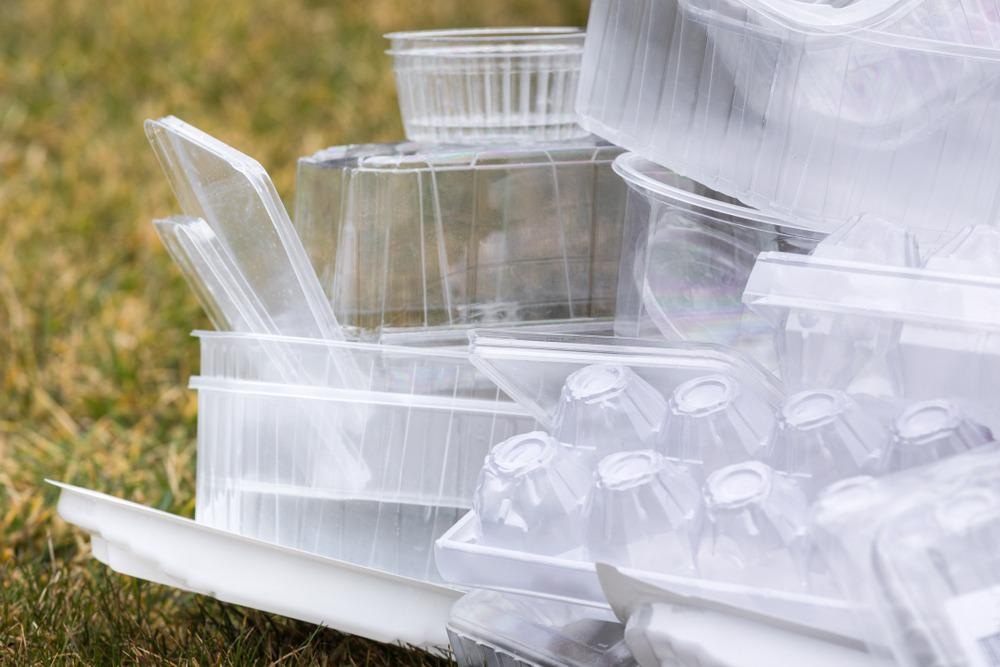A wood-based packaging solution, developed by Holmen Iggesund, one of the largest producers of premium fiber-based paperboard in Europe, demonstrates how three-dimensional formable products, such as cups and trays, can be made from a sustainable plastic alternative.

Image Credit: Konektus Photo/Shutterstock.com
Synthetic plastic derived from petrochemicals is the preferred packaging material for food, cosmetics, or pharmaceutical products. Traditional plastics provide superior functionality for use as packaging materials, including low production cost, being lightweight, and outstanding mechanical and barrier properties that ensure excellent protection of the packaged product.
Plastic Production, Use, and Disposal Emit Large Amounts of Greenhouse Gasses
However, synthetic plastic manufacturing and waste cause significant harm to the environment. Microplastics (plastic fragments smaller than 5 mm in size) have been found everywhere on our planet, polluting entire ecosystems.
If plastic production and use grow at the current rate, CO2 emissions associated with plastic manufacturing will account for 17% of the global carbon budget by 2050. This budget accounts for the maximum amount of greenhouse gasses emitted into the atmosphere that would permit maintaining the global temperature increase below 1.5°C.
Recycling is one of the simplest solutions to minimizing the environmental impact of plastics. However, only 10% of global plastic waste is currently recycled, with more than 60% of this waste caused by plastic packaging.
Transitioning from Single-Use Plastic Packaging to Wood-Based Packaging
Growing environmental concerns from industry and consumers have driven the development of innovative bio-based materials as alternatives to fossil-derived polymers for packaging applications.
There is plenty of room for improvement and scientists are working on sustainable plastic alternatives that can be as versatile, cheap, and ubiquitous as traditional plastics.
Developing bio-based packaging materials is a promising approach that could substantially reduce greenhouse gas emissions. Bio-based plastic alternatives are manufactured from plant-based feedstock, thus capturing atmospheric CO2 as plants grow.
When these bio-based materials are recycled or composted, CO2 is released back to the atmosphere, making the material nearly carbon-neutral (as the manufacturing process generates a negligible amount of greenhouse gasses).
Applications of bio-based materials in the sustainable packaging industry have shown strong growth in the last decade, marking a transition towards greener packaging, waste reduction, and focusing on biodegradable and bio-renewable materials.
Currently, bio-based materials represent only 1% of the packaging materials used in Europe and North America. However, the global demand for bio-based packaging materials is expected to grow rapidly in the next few years, exceeding 9 million tons annually by 2023.
Sustainable Fiber Materials for Formable Packaging Solutions
The need for sustainable packaging solutions and single-use consumer products led the Swedish paperboard manufacturing company Holmen Iggusend to the development of an innovative wood-fiber-based formable packaging solution called Conic.
The initial packaging prototype has been designed for use in the cosmetics industry. It consists of a conical-shaped refill that could be used for creams or liquid soaps and a transparent holder with a lid.

Image Credit: Billion Photos/Shutterstock.com
The 3D-formed refill pots resemble plastic and mirror the lines and angles of the transparent conical-shaped holder, which has a glass-like appearance.
All components, however, are completely wood-based and manufactured from sustainably sourced materials. Holmen Iggesund’s Invercote premium paperboard is used for the outer box, allowing cosmetics manufacturers to support sustainability while preserving their premium position.
Collaborative Approach Delivers Sustainable Plastic Alternative for Packaging Applications
Holmen Iggusend developed the prototype with the help of two Swedish innovation companies.
The Loop Factory is an emerging technology provider specialized in sustainable materials and products that enable circular economic solutions. The company's dry-forming technology, branded Yangi, is at the heart of Conic.
Yangi is a manufacturing technology that uses dry cellulose-based fibers to produce 3D-formed packaging materials. Resulting from more than 10 years of R&D work, Yangi combines two technology principles, fast pressing together with proprietary paper chemistry know-how, resulting in a clean and efficient manufacturing process.
The dry-forming process allows the reduction of energy consumption by 75% compared to alternative fiber molding technologies. The Loop Factory team regards the wood-based formable material to be the best alternative to rigid plastic packaging in terms of performance, cost, and environmental impact.
The use of renewable wood-based materials and the high recyclability of paper-based packaging reduces the final product's carbon footprint by 90% compared to conventional packaging plastics.
The partnership between Holmen Iggusend, The Loop Factory and Grow, a brand development consultancy, will allow the scaling up of the innovative packaging technology and will offer it to global industrial partners.
The wood-based packaging solution is not yet shelf-ready and requires further development. Meanwhile, Grow's Future Packaging Lab is creating exposure and promoting strategic use-cases to attract industrial partners needed to realize the full potential of Conic.
More about reducing the effect of plastics: Creating Biobased Replacements for Toxic Precursors of Plastic Production
A Sustainable and Resource-Efficient Way to Replace Single-Use Plastics
Other companies such as PulPac and Stora Enso intensively develop dry-forming technology to convert wood fiber into water-resistant packaging for the food industry, such as eco-friendly paper bottles, containers, and trays.
The improved sophistication and availability of recyclable, renewable, and biodegradable wood-based packaging solutions marks an important step in bringing onto the market a genuinely sustainable alternative while offering end-user qualities that match those of traditional packaging.
References and Further Reading
Packaging Europe (2021) Wood-based packaging prototype developed for formables. [Online] https://packagingeurope.com/ Available at: https://packagingeurope.com/wood-based-packaging-prototype-developed-for-formables (Accessed on 8 October 2021).
J. Poole (2021) The Loop Factory secures EU Horizon funding for Dry Forming Technology commercialization. [Online] www.packaginginsights.com Available at: https://www.packaginginsights.com/news/the-loop-factory-secures-eu-horizon-funding-for-dry-forming-technology-commercialization.html (Accessed on 8 October 2021).
Food-Drink & Innovations (2021) Stora Enso and Pulpex partner to produce fiber-based bottles on industrial scale. [Online] https://fooddrinkinnovations.com/ Available at: https://fooddrinkinnovations.com/ (Accessed on 8 October 2021).
European Bioplastics (2020) Bioplastics market data. [Online] www.european-bioplastics.org Available at: https://www.european-bioplastics.org/market (Accessed on 8 October 2021).
Reichert, C. L., et al. (2021) Bio-Based Packaging: Materials, Modifications, Industrial Applications and Sustainability. Polymers 12, 1558. Available at: https://doi.org/10.3390/polym12071558
Deshwal, G.K., et al. (2019) An overview of paper and paper based food packaging materials: health safety and environmental concerns. J. Food. Sci. Technol. 56, 4391–4403. Available at: https://doi.org/10.1007/s13197-019-03950-z
Disclaimer: The views expressed here are those of the author expressed in their private capacity and do not necessarily represent the views of AZoM.com Limited T/A AZoNetwork the owner and operator of this website. This disclaimer forms part of the Terms and conditions of use of this website.